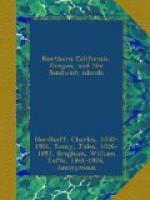CANTO IX.
The head of the cloud bears down
And whispers a word in my ear:
It is I! the food of a rainy day.
O Kahelaha, of Puna,
My adopted son,
Heartless fellow!
We two were comrades
In times of poverty;
In the day of battle
We were together at Wailua.
It might be said
My death was proclaimed
In Kauai.
Good to look upon
Is the strength of Kawelo.
He knows not how to throw stones.
Farewell to you, Kaheleha
Of Puna.
Thy head is split by my spear,
A spliced container!
The whitening form is to be seen.
O Aikanaka, loving only in name,
To you and yours,
Farewell!
Farewell to the ensnared,
The youngest born.
History declares, and this ninth canto confirms it, that Kaheleha of Puna, Kawelo’s friend from his youth, and one of his powerful companions in arms at the descent on Wailua, believed that Kawelo was mortally wounded beneath the shower of stones that had covered him, and this belief had induced him to go over to the camp of Aikanaka. Verses fourteen to sixteen are the words that Kawelo reproaches Kaheleha with saying before his enemies. Kaheleha was slain by the hand of Kawelo at the same time with Aikanaka.
PAHA UMI.
Me he ulu wale la
I ka moana,
O Kauai nui moku lehua;
Aina nui makekau,
Makamaka ole ia Kawelo.
Ua make o Maihuna ’lii,
Maleia ka makuahine;
Ua hooleiia i ka pali nui,
O laua ka! na manu
Kikaha i lelepaumu.
Aloha mai o’u kupuna:
O Au a me Aalohe,
O Aua, a Aaloa,
O Aapoko, o Aamahana.
O Aapoku o Aauopelaea:
Ua make ia Aikanaka.
CANTO X.
Like a forest rising abruptly
Out of the ocean,
Is Kauai, with flowery lehua;
Grand but ungrateful land,
Without friends or dear ones for Kawelo.
They have put to death Maihuna,
As also Malei, my mother.
They have cast from a great pali
Both of them! Were they birds
To fly thus in the air?
Love to you, oh my ancestors:
To you, Au and Aaloha,
To you, Aua and Aaloa,
Aapoko and Aamahana,
Aapoku and Aauopelaea,
Who died by the hand of Aikanaka.
Maihuna was the father of Kawelo, and Aikanaka was his first cousin. The latter put to death all the family of Kawelo, after having employed them, with the other inhabitants of Kauai, in collecting the stones which were to repulse his cousin. It was before the great battle of Wailua that Kawelo’s family was put to death.
In the last canto the hero reproaches his friends for abandoning him in the day of danger. At the sight of his old friends, whose bodies he had pierced with many wounds in punishment, he cries: “Where are those miserable favorites?” He had transfixed them with his lance—that lance made, he says, for the day of battle.




